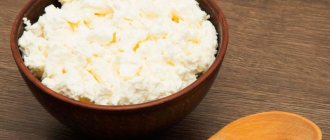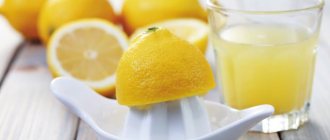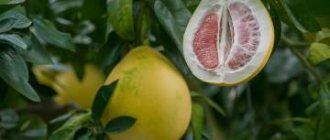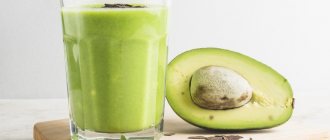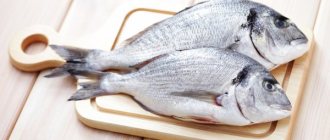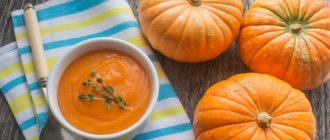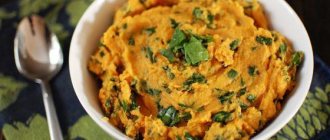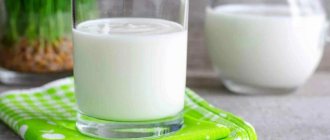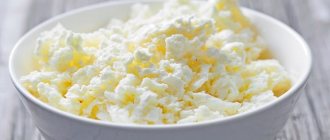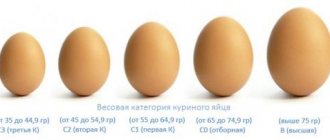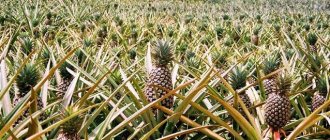What is Snowball and how is it produced?
The benefits of the fermented milk product Snezhka are determined by the preparation technology. Production has not changed since it was first developed. A healthy drink is made from pasteurized milk by fermentation. 8% beet sugar is added to it. Then pasteurize from 90 °C. After this, homogenize at a pressure of 175 at.
The mixture is cooled to a temperature of 45 °C. Then ferment for 3 hours. At the end of cooking, after reaching the desired density, add berry syrups or sweetener.
What is "Snowball"?
Essentially, “Snowball” is a fermented milk drink. Its recipe is quite complex, since the milk is heated and cooled to the desired temperature under certain conditions. The consistency of the product is similar to kefir. That is, it is moderately liquid, moderately viscous. Its structure is homogeneous.
The color of the drink is white, with a slight peach tint. It can taste either natural, sour, or fruity. In the latter case, both the addition of sugar and fruit syrup are allowed.
Benefits of fermented milk drink Snowball for the body
The beneficial properties include many factors. For example, the following are distinguished:
- regulates metabolism and metabolic processes;
- restores the functioning of the intestines and stomach;
- fermented milk drink Snezhok helps with pancreatitis;
- has the property of reducing the accumulation of gases;
- the benefit is to strengthen bone tissue;
- saturates with useful microelements.
It regulates the functioning of the gastrointestinal tract. But the useful properties of Snowball do not end there. Thanks to this, the process of digesting food is more active. Breastfeeding mothers experience improved quality of breast milk after including it in their diet. The properties also include the restoration of a woman’s body after childbirth.
Useful properties and contraindications
The drink "Snowball" has many beneficial properties. However, there are a number of contraindications. Thus, it is not recommended for use by those who suffer from lactose intolerance or other components of this product.
The benefits of the drink are also clearly expressed. First of all, it contains a large amount of B vitamins. Thus, it is recommended to add it to food for those who suffer from irregular menstrual cycles. So this specific fermented milk product can and should be consumed by women and girls. This is also due to the fact that the drink contains vitamin E. In itself, it is a powerful antioxidant; it weakens the negative impact of the environment on the human body.
Due to the fact that the “Snowball” drink is able to regulate metabolism, it is recommended for those who suffer from excess weight. Also, many doctors advise those with diabetes to use it. In this case, it is better to focus on a natural product, without sweet additives.
An interesting fact is that the lactic acid contained in this drink helps stimulate digestion. Therefore, regular consumption of “Snowball” can restore appetite and also help intestinal function.
The fermented milk drink “Snowball” is also recommended for those recovering from physical activity or illness. This is due to the large amount of vitamins A and C. At the same time, digesting the drink does not require additional energy expenditure from a weakened body.
At what age can Snowball be given to children?
Fermented milk dessert is an unadapted product for children. It will not bring benefits to a child at an early age due to its properties. It can be given no earlier than 1 year of age, so as not to cause harm to health.
Inclusion at an early age leads to:
- iron and zinc deficiency;
- has the property of increasing the load on the kidneys;
- contributes to the development of anemia.
It also provokes diabetes and obesity. The beneficial properties affect only adults. The protein contained in cow's milk is not absorbed by the child's body. It is recommended to consult a pediatrician about the dangers and benefits of the drink for newborns.
Micro- and macroelements in the drink “Snowball” 2.5% fat
The drink “Snowball” 2.5% fat contains the following elements: Mono- and disaccharides, SFAs - Saturated fatty acids, Cholesterol, Ash, Water, Organic acids, Sodium, Potassium, Phosphorus, Magnesium, Calcium, Sulfur, Copper, Aluminum, Strontium , Iodine, Manganese, Chromium, Fluorine, Molybdenum, Cobalt, Selenium, Tin, Zinc, Iron, Chlorine.
| Micro and macro element | Meaning |
| Mono- and disaccharides, g. | 10,8 |
| SFA - Saturated fatty acids, g. | 1,5 |
| Cholesterol, mg | 8 |
| Zola, Mr. | 0,7 |
| Water, city | 82,5 |
| Organic acids, g. | 0,8 |
| Sodium, mg | 50 |
| Potassium, mg | 136 |
| Phosphorus, mg | 94 |
| Magnesium, mg | 15 |
| Calcium, mg | 121 |
| Sulfur, mg | 27 |
| Copper, µg | 12 |
| Aluminum, µg | 50 |
| Strontium, mcg | 17 |
| Iodine, mcg | 9 |
| Manganese, mg | 0,006 |
| Chromium, µg | 2 |
| Fluorine, mcg | 20 |
| Molybdenum, mcg | 5 |
| Cobalt, µg | 0,8 |
| Selenium, mcg | 2 |
| Tin, µg | 13 |
| Zinc, mg | 0,4 |
| Iron, mg | 0,1 |
| Chlorine, mg | 110 |
Snowball while breastfeeding
Breastfeeding mothers need to include fermented milk products in their diet, including Snowball. The dessert has beneficial properties and improves the composition of breast milk.
Warning! For the first time, it is recommended to eat no more than 2 tbsp. l., so as not to harm the baby during feeding.
If the baby reacts normally, the portion can be increased. You need to look at the expiration date and not drink expired Snowball. It is recommended to include it in the diet 3 months after birth, so as not to harm the baby with the new product.
Is it possible to drink Snowball while losing weight (on a diet)
The drink has a lot of beneficial properties and is low in calories. But it is not recommended to abuse it while on a diet. It is especially not advisable to drink Snowball at night, as many healthy eating sites advise. Contains sugar. It is prohibited in dietary nutrition and causes a lot of harm to health.
You can drink healthy fermented milk product in the first half of the day. At this time, calories are actively broken down, and simple carbohydrates are not stored in fat. And after training, despite all the benefits, you should absolutely not drink Snowball.
Foreign taste
The taste properties of some samples also turned out to be not the best. Thus, in “Snezhka”, “Traditional Taste from Vologda” and “Avida”, clear signs of poor quality were found - an extraneous aftertaste that should not be there.
Expertise "Snowball"
“Cheerful Milkman,” as experts noted, has a slightly spicy taste, which is not typical for “Snowball.” In Izbenka, the fermented milk taste is less pronounced than necessary. All other samples have good taste.
Some samples were let down by their consistency: “Traditional Taste from Vologda” and “Kuban Milkman” are viscous (the first is also viscous), and “Izbenka” is too liquid.
Recipe for making Snowball at home
A healthy drink can be prepared at home. Store-bought dessert can be harmful if the technology has been violated. For fermentation at home, use only natural yogurt. It has more benefits.
Ingredients:
- 150 ml yoghurt starter;
- 1 liter of milk.
Fermentation process:
- Boil the milk. Pour into a sterilized container and refrigerate until the temperature reaches 40°C.
- Add the starter and mix thoroughly. Wrap the mixture and leave it in a warm place for a day. Then put it in the refrigerator for 4 hours.
After fermentation, consume within two days. It has the property of deteriorating quickly. There will be more benefit than harm if you do not add sugar or berry-fruit jams to it. Homemade dessert differs only in nutritional properties due to the absence of preservatives.
What can you cook from Snowball?
Pancakes are fried using this product. Ingredients:
We recommend reading: What are the benefits of wheat bran, reviews
- 3 tbsp. l. spoons of water or mineral water;
- Snowball packaging;
- 250 grams of wheat flour;
- 1 tsp. soda and fine salt;
- 50 grams of granulated sugar;
- oil.
We recommend reading: Baking soda: beneficial properties, uses, how to take
Making healthy pancakes:
- Beat the ingredients into a fluffy mass. Leave in the refrigerator for 1 hour so that the dough “rests” and rises.
- Heat a frying pan and pour a small amount of oil.
- Fry the pancakes for 20 seconds on each side.
The dish will be more beneficial if you do not use oil.
The drink also makes cupcakes. Ingredients:
- 100 ml Snowball;
- 2 eggs;
- 85 grams of granulated sugar;
- 2 tbsp. l. sunflower oil;
- 110 g flour;
- 100 grams of chopped nuts;
- vanilla;
- 1 packet of baking powder.
Preparing the cake:
- Separate the yolks from the whites. Place in a deep bowl, add butter, sugar and beat with a mixer. Pour in the Snowball and repeat the process. The mixture should have a creamy consistency.
- Mix flour with baking powder. Pour into egg mixture. Beat the whites into a fluffy foam and mix with the flour. Add chopped nuts.
- Preheat the oven to 180°C. Pour the dough into the mold. Place the cake in the oven and bake for 30 minutes. Decorate the dish with powdered sugar. This cupcake is not only delicious, but also healthy.
A smoothie is prepared based on this ingredient. The drink has many nutritional properties, which allows it to be included in dietary nutrition. And it won't harm your figure.
Products:
- 100 ml Snowball;
- 1 banana;
- 2 tbsp. l. cherry syrup (you can add other syrup if desired);
- coconut flakes (or chopped nuts);
- 100 grams of sour berries.
Recommended reading: Benefits of bananas
Preparation
- Place all ingredients in a blender. Whip until the smoothie has a homogeneous consistency. The process takes 2 minutes.
- Add berry syrup to the dessert and garnish with coconut flakes.
Important! This fruit and milk drink contains many beneficial properties. Therefore it is suitable for breakfast.
Calories Snowball. Chemical composition and nutritional value.
Nutritional value and chemical composition of “Snowball”.
The table shows the nutritional content (calories, proteins, fats, carbohydrates, vitamins and minerals) per 100 grams of edible portion.
| Nutrient | Quantity | Norm** | % of the norm in 100 g | % of the norm in 100 kcal | 100% normal |
| Calorie content | 170 kcal | 1684 kcal | 10.1% | 5.9% | 991 g |
| Squirrels | 13.1 g | 76 g | 17.2% | 10.1% | 580 g |
| Fats | 7 g | 56 g | 12.5% | 7.4% | 800 g |
| Carbohydrates | 13.9 g | 219 g | 6.3% | 3.7% | 1576 g |
| Organic acids | 1.2 g | ~ | |||
| Water | 67.8 g | 2273 g | 3% | 1.8% | 3353 g |
| Ash | 1 g | ~ | |||
| Vitamins | |||||
| Vitamin A, RE | 55 mcg | 900 mcg | 6.1% | 3.6% | 1636 g |
| Retinol | 0.05 mg | ~ | |||
| beta carotene | 0.03 mg | 5 mg | 0.6% | 0.4% | 16667 g |
| Vitamin B1, thiamine | 0.04 mg | 1.5 mg | 2.7% | 1.6% | 3750 g |
| Vitamin B2, riboflavin | 0.27 mg | 1.8 mg | 15% | 8.8% | 667 g |
| Vitamin B4, choline | 46.7 mg | 500 mg | 9.3% | 5.5% | 1071 g |
| Vitamin B5, pantothenic | 0.28 mg | 5 mg | 5.6% | 3.3% | 1786 |
| Vitamin B6, pyridoxine | 0.11 mg | 2 mg | 5.5% | 3.2% | 1818 |
| Vitamin B9, folates | 35 mcg | 400 mcg | 8.8% | 5.2% | 1143 g |
| Vitamin B12, cobalamin | 1 mcg | 3 mcg | 33.3% | 19.6% | 300 g |
| Vitamin C, ascorbic acid | 0.5 mg | 90 mg | 0.6% | 0.4% | 18000 g |
| Vitamin D, calciferol | 0.054 mcg | 10 mcg | 0.5% | 0.3% | 18519 g |
| Vitamin E, alpha tocopherol, TE | 0.2 mg | 15 mg | 1.3% | 0.8% | 7500 g |
| Vitamin H, biotin | 5.1 mcg | 50 mcg | 10.2% | 6% | 980 g |
| Vitamin RR, NE | 3.9 mg | 20 mg | 19.5% | 11.5% | 513 g |
| Niacin | 0.4 mg | ~ | |||
| Macronutrients | |||||
| Potassium, K | 112 mg | 2500 mg | 4.5% | 2.6% | 2232 g |
| Calcium, Ca | 164 mg | 1000 mg | 16.4% | 9.6% | 610 g |
| Magnesium, Mg | 23 mg | 400 mg | 5.8% | 3.4% | 1739 |
| Sodium, Na | 41 mg | 1300 mg | 3.2% | 1.9% | 3171 g |
| Sera, S | 180 mg | 1000 mg | 18% | 10.6% | 556 g |
| Phosphorus, P | 220 mg | 800 mg | 27.5% | 16.2% | 364 g |
| Chlorine, Cl | 152 mg | 2300 mg | 6.6% | 3.9% | 1513 g |
| Microelements | |||||
| Aluminium, Al | 50 mcg | ~ | |||
| Iron, Fe | 0.4 mg | 18 mg | 2.2% | 1.3% | 4500 g |
| Yod, I | 9 mcg | 150 mcg | 6% | 3.5% | 1667 g |
| Cobalt, Co | 1 mcg | 10 mcg | 10% | 5.9% | 1000 g |
| Manganese, Mn | 0.008 mg | 2 mg | 0.4% | 0.2% | 25000 g |
| Copper, Cu | 74 mcg | 1000 mcg | 7.4% | 4.4% | 1351 g |
| Molybdenum, Mo | 7.7 mcg | 70 mcg | 11% | 6.5% | 909 g |
| Tin, Sn | 13 mcg | ~ | |||
| Selenium, Se | 30 mcg | 55 mcg | 54.5% | 32.1% | 183 g |
| Strontium, Sr | 17 mcg | ~ | |||
| Fluorine, F | 32 mcg | 4000 mcg | 0.8% | 0.5% | 12500 g |
| Chromium, Cr | 2 mcg | 50 mcg | 4% | 2.4% | 2500 g |
| Zinc, Zn | 0.394 mg | 12 mg | 3.3% | 1.9% | 3046 g |
| Digestible carbohydrates | |||||
| Mono- and disaccharides (sugars) | 3 g | max 100 g | |||
| Sterols (sterols) | |||||
| Cholesterol | 27 mg | max 300 mg | |||
| Saturated fatty acids | |||||
| Saturated fatty acids | 5.2 g | max 18.7 g | |||
| Monounsaturated fatty acids | 2.64 g | min 16.8 g | 15.7% | 9.2% | |
| Polyunsaturated fatty acids | 0.515 g | from 11.2 to 20.6 g | 4.6% | 2.7% | |
| Omega-3 fatty acids | 0.075 g | from 0.9 to 3.7 g | 8.3% | 4.9% | |
| Omega-6 fatty acids | 0.44 g | from 4.7 to 16.8 g | 9.4% | 5.5% |
The energy value of Snowball is 170 kcal.
Primary Source: Created in the application by the user. Read more.
** This table shows the average levels of vitamins and minerals for an adult. If you want to know the norms taking into account your gender, age and other factors, then use the “My Healthy Diet” application.
